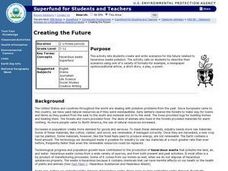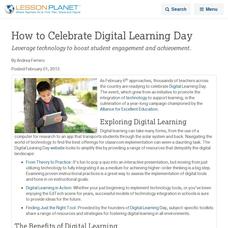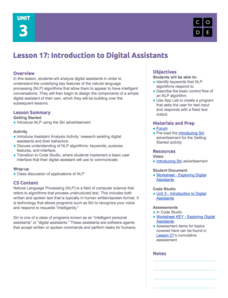Curated OER
Fields of the Future
Students investigate India's technology outsourcing, and examine their own career choices to determine what technology is required in the field. Students dermine how careers have changed over time and speculate future changes, then write...
Curated OER
High Performance in Agriculture Science: Graduates Outperform Others
Students plan for their future by exploring occupational experience programs.In this career lesson plan students list activities that they will participate in in the future and complete a career exploration project.
Curated OER
Aqueduct Architecture: Moving Water to the Masses in Ancient Rome
Ninth graders compare ancient and modern technology in water transporting. In this lesson on the evolution of the aqueduct, 9th graders build a working aqueduct model and examine its components. They explain the importance and use of the...
Curated OER
Creating the Future
Students work together to develop and write scenerios for the future of hazardous waste cleanup. They share their scenerios with the class. They complete activities as well.
Curated OER
Energy of the Future
Students examine technologies that already exist and record their findings in a journal. They work with students in other countries to explore alternative energy sources They publish their designs online.
Teach Engineering
The Amazing Red Planet
Introduce your class to Mars with a resource that provides information about its size, location, length of day, length of year, number of moons, and average temperature. Also includes is information about the lans for past...
Middle Tennessee State University
The Invention of the Telephone
All of the people in your class would agree that life would be different without the invention of the telephone! Study Alexander Graham Bell's most famous and influential invention through the primary source document of his...
Curated OER
How to Celebrate Digital Learning Day
Leverage technology to boost student engagement and achievement.
NASA
Lunar Plant Growth Chamber
Would astronauts be able to grow their food on the Moon? Teams research plant growth in order to design and build a growth chamber that will function on the lunar surface. They narrow down plant choices based upon their...
Social Media Toolbox
Why Social Media?
Is social media the best way to convey news in your school? Young journalists dig deep into the social media question in the second of 16 lessons from The Social Media Toolbox. After learning about the relationship between social media...
DiscoverE
Nanomedicine
Cancer patients need as much help as they can get. Future engineers design a system that delivers cancer medicine to the lungs but doesn't harm other organs. Using ferrofluids and iron particles, they test out their delivery systems.
Rochester Institue of Technology
Patient Flow
It's time to redesign the healthcare system. The seventh installment of a 9-part technology/engineering series teaches future engineers about patient flow and how to design healthcare centers to improve flow. Classroom simulations allow...
Code.org
Introduction to Digital Assistant Project
How does a computer recognize voice commands? Scholars learn about digital assistants and natural language processing (NLP) algorithms in the ninth lesson of the series. They begin building a simple digital assistant and work on this...
DiscoverE
Rocket Challenge
You might just be responsible for launching a future career in rocket science. Pupils use Alka-Seltzer® tablets as the power source for a film-canister rocket. These rockets must able to carry a clay payload and hit a target on a wall.
TryEngineering
Nano Waterproofing
Does your shirt hate water? In the activity, future engineers observe the hydrophobic effect in fabrics. They brainstorm and test some ideas for waterproofing fabrics.
American Institute of Architects
Architecture: It's Elementary!—Fifth Grade
Young citizens construct an understanding of urban planning in this cross-curricular unit. Covering every aspect of city development from the political, economic, and social influences to sustainable building practices, this...
Krzysztof Haft-Szatynski
Move the Turtle
Turtles are not known to be speedy movers, but have you ever tried to get them to move in a specific direction? How about getting them to move in a perfect circle? With this app, young computer programmers have to be on their toes to...
Code.org
Events Unplugged
Introduce event-driven programming. Young computer scientists learn the meaning of event-driven programming and how it is different from previous styles of programming. They play a card game to simulate the challenges that occur in this...
Social Media Toolbox
Law Review
How can your journalism class ensure they use social media responsibly and legally? The sixth lesson in a 16-part Social Media Toolbox series asks pupils to dig deep into the legal aspects of social media use by school publications....
California Department of Education
Workplace Skills
What skills do employers look for in potential employees? Introduce scholars to the skills that pay the bills during the second of six career and college readiness lesson plans. Once they have defined critical 21st-century skills, groups...
Mascil Project
The Pipe Clamp
Clamp onto the resource and don't let go. Future mechanical engineers produce a pipe clamp from a sheet of metal. This idea is to use the pipe clamp to affix a pull-up bar in a doorway.
Microsoft
Variables
You won't want to replace the resource with anything else. Future computer scientists use Minecraft to learn about variables in computer coding. They engage in several activities to master the variable code block, then apply it in an...
Curated OER
"The Vision" Contest
Students study a current technology and predict what that technology will be like 30 years from now. They research the technology's origins, how it presently works, and what it might entail in the future. They develop higher order...
Curated OER
Technology for Learning
Students examine how technology has changed the way students learn and study. They complete a number of tasks including matching activities, reading about MP3 players, discussing the effects of technology, and finally, designing...

























